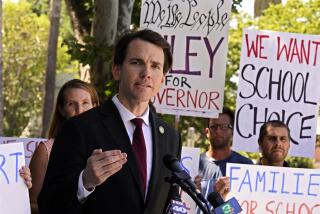FEC Denies Hart Bid for Matching Funds
- Share via
WASHINGTON — The Federal Election Commission ruled 5 to 1 Thursday that Gary Hart cannot receive federal matching funds for his aborted presidential bid, leaving the former Democratic front-runner with no immediate prospects for paying roughly $1.6 million in debt.
Hart’s lawyers Thursday promised further appeals, but conceded that the path ahead will be “difficult.” At the same time, Hart’s creditors said they will continue court efforts to freeze his campaign committee’s remaining assets.
The FEC’s decision will cost Hart as much as $900,000 and will keep alive the debt issue that plagued his short-lived campaign and now clouds his return to private life.
Faltering Hopefuls
The ruling--the first by the FEC on the availability of matching funds for candidates who drop out before the election primaries--may also encourage other faltering presidential hopefuls to prolong their bids solely to guarantee access to federal money.
“I’m a little concerned about taking a very, very--as I called it--’wooden’ approach” to the law, said FEC Chairman Scott E. Thomas, the only commissioner to support Hart’s position in a commission session. “All we’re going to do is encourage someone like that to put up a front” until the federal checks arrive, Thomas said.
But, replied commission member John W. McGarry, “I don’t think this is a very difficult question. I think the words of the statute are very clear” that a candidate must be “seeking the nomination” when he applies for matching federal funds. Hart dropped out of the race on May 8 and filed his matching fund application on May 18.
Matching Money
Federal law provides matching money dollar-for-dollar for the first $250 of each contribution a candidate receives from an individual. The money is available to candidates who are actively involved in the race and who have raised a nominal amount of money in at least 20 states.
Hart representatives argued that the commission should grant an exception because Hart was an active candidate at the time the contributions were raised.
Hart attorney Donald Simon said he would appeal to the FEC to reconsider its ruling and that a decision would be made later on whether to file an appeal in federal court.
In the meantime, Hart lawyers will be in court in their attempt to fend off creditors.
Although Hart aides had initially said that his 1988 campaign had a small surplus, his auditors now say it ended up $313,000 in the red. In addition, Hart still owes roughly $1.3 million from his 1984 presidential bid.
‘No Personal Liability’
Hart has “no personal liability” for the debts, Simon insisted. But at least one creditor plans to argue that Hart separated his 1988 campaign committee from his 1984 organization solely to avoid paying the 1984 debts and that he personally should be liable.
“The question is, who is responsible when an institution is created to avoid paying debts,” said James S. Turner, a Washington attorney for Semper-Moser Associates of Venice, Calif., a media consulting firm that won a judgment for $163,000 for a 1984 debt. “No. 1 on our list is Gary Hart.”
Federal court actions have been filed so far in Los Angeles, Denver and Washington. Creditors have tried to seize certificates of deposit, cash, bank accounts, and, in one case, a series of 93 Robert Raushenberg lithographs that the artist pledged as collateral in 1984 to help Hart obtain a $3.5-million loan.
More to Read
Get the L.A. Times Politics newsletter
Deeply reported insights into legislation, politics and policy from Sacramento, Washington and beyond. In your inbox twice per week.
You may occasionally receive promotional content from the Los Angeles Times.











